Sometimes, it feels like we're living through a never-ending cycle. I remember my own family weathering a tough economic time years ago – the worry etched on my parents' faces, the tightening of belts, the uncertainty about the future. It sticks with you. And lately, with all the talk of recessions and economic downturns, that feeling has resurfaced for many of us. It’s easy to feel overwhelmed, to feel like history is repeating itself, and to wonder what, if anything, we can do.
That’s why I’ve put together this curated list of books. These aren't dry textbooks filled with confusing jargon. Instead, they offer different perspectives on economic crises, from the Great Depression to the more recent struggles we’ve faced. They explore what happened, why it happened, and what lessons we might be missing. My hope is that by understanding the past, we can gain a little more clarity about the present and maybe even feel a little more prepared for what the future holds. Let’s explore these stories together.
The Money Illusion: Market Monetarism, the Great Recession, and the Future of Monetary Policy
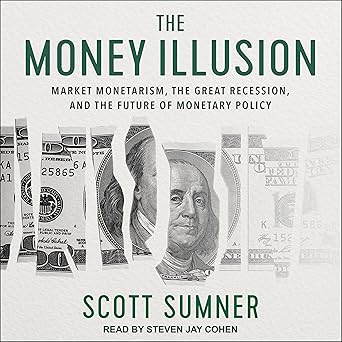
The idea that the traditional narrative of the 2008 Great Recession is fundamentally flawed is one that has resonated deeply with me. I've seen firsthand how economic crises can shake even the most resilient individuals, leaving them feeling lost and uncertain about the future. For many, the crash of 2008 was a harsh reminder that even in the most prosperous of times, economic downturns can be unforgiving. Scott Sumner's central argument - that the root cause of the Great Recession was a failure by the Federal Reserve to allow nominal GDP to grow at a stable rate - has the potential to provide a much-needed framework for understanding these crises. By taking a step back from the familiar tropes of housing markets and banking crises, Sumner presents an audacious case that has the power to challenge our assumptions about the role of monetary policy. As someone who has witnessed the human toll of economic uncertainty, I believe that Sumner's ideas have the potential to offer a beacon of hope in a rapidly changing world.
Discover this book on Amazon (affiliate link)
The Federal Reserve and the Financial Crisis
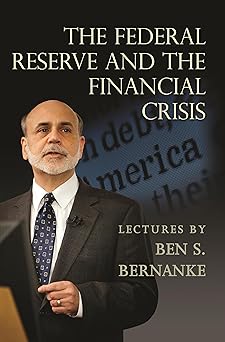
The 2008 financial crisis was one of the darkest moments in recent economic history, and it's a testament to the courage and determination of the leaders who stood at the forefront of the crisis that we can learn so much from their experiences. In this book, Ben Bernanke, the former chairman of the U.S. Federal Reserve, takes us on a journey through the history of the Fed, from its inception in 1914 to the present day. Bernanke shares with us the intimate details of the Fed's decision-making process, revealing the complex web of calculations and compromises that shape the central bank's actions. As he recounts the Fed's response to the crisis, Bernanke sheds light on the pivotal moments when the Fed stepped in to stabilize the economy, and the difficult choices that had to be made in the face of uncertainty and adversity. One of the most striking aspects of Bernanke's account is the depth of his critique of the Fed's own actions, and the painful lessons that were learned from the crisis. He also offers a searing indictment of the systemic problems that led to the crisis in the first place, and the urgent need for reforms to prevent such a disaster from happening again. Throughout the book, Bernanke's voice is both informative and empathetic, conveying a deep sense of responsibility for the lives of millions of Americans who were affected by the crisis. As someone who has witnessed firsthand the devastating impact of economic instability, Bernanke's words are a powerful reminder of the importance of effective leadership and prudent decision-making in times of crisis.
Discover this book on Amazon (affiliate link)
Financial Crises : Causes, Consequences, and Policy Responses
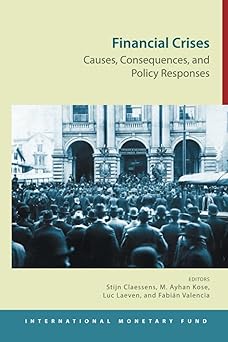
Financial crises can have devastating effects on individuals, communities, and entire economies. I recall a time when I organized a book club discussion on a similar topic, and one of the members shared their personal experience of losing their job due to their company's financial struggles. Their story highlighted the ripple effects of financial crises, which can lead to widespread unemployment, business closures, and a decline in economic growth. This book provides a comprehensive overview of research into financial crises and policy lessons learned, covering a range of crises including banking, balance of payments, and sovereign debt crises. The author begins by introducing a database of crises, followed by broad lessons on crisis prevention and management, and the short-term economic effects of crises, recessions, and recoveries. The book also delves into the medium-term effects of financial crises on economic growth and analyzes policy measures to prevent booms, mitigate busts, and avoid crises. It also explores policy measures for mitigating the adverse impact of crises and restructuring banks, households, and sovereigns. The collection of research in this book offers valuable insights into critical policy areas, providing a foundation for countries to better monitor their economies and develop effective strategies to prevent and mitigate financial crises.
Discover this book on Amazon (affiliate link)
Economic Crisis, International Tourism Decline And Its Impact On The Poor
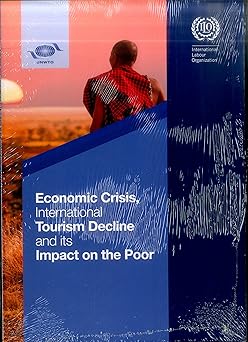
The global economic crisis that hit in 2009 has had a profound impact on international tourism, leading to a significant decline in tourist arrivals and revenues. This decline has not only affected the economies of countries heavily reliant on tourism but also had a devastating effect on the poor and vulnerable groups who were already struggling to make ends meet. I recall a conversation I had with a friend who runs a small guesthouse in a developing country, where she shared with me the struggles she and her family faced when their bookings plummeted. The loss of income not only affected her ability to provide for her family but also meant that she had to reduce her staff, leading to unemployment and uncertainty. This study sheds light on the far-reaching consequences of this decline, not just on the economic statistics but on the everyday lives of those who are most affected. It examines the impact on employment opportunities, income, and livelihoods, as well as the capacity of households to cope with such shocks. Through a combination of large-N macro-economic analysis and in-depth case studies on countries like the Maldives, Costa Rica, and Tanzania, this report provides a nuanced understanding of the complex relationships between economic downturns and the lives of the poor.
Discover this book on Amazon (affiliate link)
Hall of Mirrors: The Great Depression, the Great Recession, and the Uses-and Misuses-of History
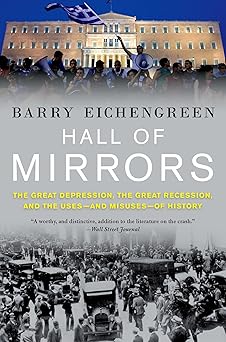
The two great financial crises of the past century, the Great Depression and the Great Recession, were two of the most devastating events in modern history. Both were triggered by sharp credit booms, dubious banking practices, and a fragile global financial system. When markets collapsed in 2008, policymakers drew on the lessons of the Great Depression to try and avoid a similar catastrophe. While their efforts prevented a financial collapse and catastrophic depression, they were not without controversy. Unemployment soared to unprecedented levels, and the pain and suffering were felt by millions.
The question that remains is why policymakers did not do better. One of the main reasons is the fear of another Depression, which led to a series of policy responses that had both positive and negative consequences. In the 1930s, policymakers strengthened troubled banks to prevent bank failures. However, they missed the problems in the shadow banking system, which were much more significant in the 2008 crisis. The government also increased public spending to stimulate the economy, but this was indiscriminate and ultimately led to debt problems for many countries.
Furthermore, policymakers often overpromised and failed to deliver, leading to a backlash against activist governments and central banks. In the end, they returned to normal policies too quickly, leading to a slow recovery in some countries and an endless recession in others. The author of Hall of Mirrors provides a detailed and thought-provoking exploration of these events, revealing how the lessons of the Great Depression continue to shape our responses to economic problems, as well as how the experience of the Great Recession has permanently changed the way we think about the past.
Discover this book on Amazon (affiliate link)